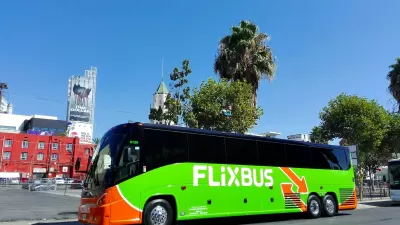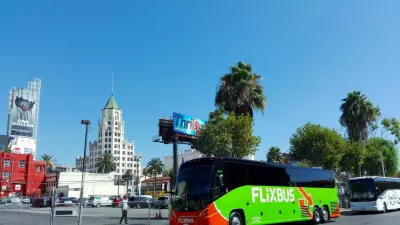As the loss of intercity bus services and stations continues, Chicago could become the largest city in the developed world without a major downtown bus terminal.

Intercity bus passengers in Chicago worry they could literally be left out in the cold just as the busy holiday season approaches, reports David Schaper for NPR, if the downtown Chicago bus terminal, the largest intercity bus connection hub in the Midwest, shuts down.
Bus companies have been slashing intercity bus service and shuttering terminals around the country, forcing passengers to wait outdoors on sidewalks or in poorly lit parking lots with no access to restrooms, ticket agents, or other amenities.
FlixBus, Greyhound’s new owner, secured a temporary, month-to-month lease on the terminal, but the company has declined to estimate how long the lease might last.
Director of DePaul University’s Chaddick Institute Joe Schwieterman stressed the importance of intercity bus service, saying, “You take away connecting points or push people out on the curb to wait, and that whole network just unravels. So it's hugely important for mobility, heavily for people with low incomes, disabled community and many others.”
According to the article, “City officials are in talks with Greyhound and other entities to try to find another location with an indoor waiting area, but there's been little progress thus far.” The CEO of Flix North America is calling on Congress to support intercity bus service by funding bus infrastructure in the same way it funds airports, passenger rail, and other public transit.
FULL STORY: Chicago may become the latest city to lose Greyhound bus services

Planetizen Federal Action Tracker
A weekly monitor of how Trump’s orders and actions are impacting planners and planning in America.

Chicago’s Ghost Rails
Just beneath the surface of the modern city lie the remnants of its expansive early 20th-century streetcar system.

San Antonio and Austin are Fusing Into one Massive Megaregion
The region spanning the two central Texas cities is growing fast, posing challenges for local infrastructure and water supplies.

Since Zion's Shuttles Went Electric “The Smog is Gone”
Visitors to Zion National Park can enjoy the canyon via the nation’s first fully electric park shuttle system.

Trump Distributing DOT Safety Funds at 1/10 Rate of Biden
Funds for Safe Streets and other transportation safety and equity programs are being held up by administrative reviews and conflicts with the Trump administration’s priorities.

German Cities Subsidize Taxis for Women Amid Wave of Violence
Free or low-cost taxi rides can help women navigate cities more safely, but critics say the programs don't address the root causes of violence against women.
Urban Design for Planners 1: Software Tools
This six-course series explores essential urban design concepts using open source software and equips planners with the tools they need to participate fully in the urban design process.
Planning for Universal Design
Learn the tools for implementing Universal Design in planning regulations.
planning NEXT
Appalachian Highlands Housing Partners
Mpact (founded as Rail~Volution)
City of Camden Redevelopment Agency
City of Astoria
City of Portland
City of Laramie





























